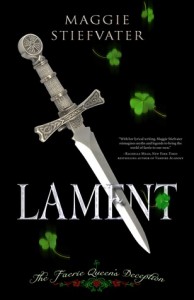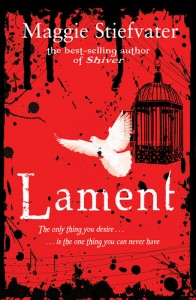The beginning: The beginning of Lament (affiliate links: Amazon, B&N, Book Depository) is not promising, dear friends. A teenager called Deirdre (Dee) meets a mysterious and handsome boy called Luke at a music festival, and they play a stunning duet together. There is some mysterious magical stuff going on, and then Dee and Luke are madly in love forever.


Cover report: Ooo, this one’s tough. Aesthetically I think the British cover is better, but I hate the tagline, and I think the American cover says more about the contents of the book. I’m giving it to the American cover in a squeaker. I will accept counterarguments.
The end (here there be spoilers so skip them if you don’t want them): The faerie queen who is so awful gets deposed, and Luke something soul something something. (I don’t know, I was bored with Luke’s whole quest to regain his soul.) And James doesn’t die. Hooray. I like James because the faerie all call him “the piper”, which makes me think of Fire and Hemlock and have consequent warm fuzzy feelings.
The whole: I love and trust y’all so I am giving Lament the benefit of the doubt, and I’m going to read Ballad to see if things improve from here. I read it at a slightly unfortunate time, having just made a list of love story fails for the Eleanor and Park podcast, and Lament fell into a lot of those traps. Stiefvater included just enough pleasing details to keep me interested — like the four-leaf clovers that kept appearing on Deirdre’s clothes — and just enough subverting of gender norms to make me curious about the subsequent books. (Further details on this would be spoilers, but suffice it to say that a lady is called upon to rescue a gentleman, rather than the other way around.)
That said, there is a dreadful power imbalance in the central relationship because Luke is a hundreds-of-years-old faerie assassin and Deirdre is a human teenager, but this isn’t addressed. Important question: Doesn’t Luke feel icky about this? Because I would feel icky dating a teenager now, and I am much fewer than hundreds of years older than a teenager.
Also: Insta-love rears its ugly head. There are so many ways to make insta-love suck less, and I don’t understand why authors are too lazy to do them. For instance, the author could signal the reader that this is not as true a love as the starry-eyed teenaged protagonist thinks it is. Or the author could pay lip service to depicting a few reasons why these characters would want to be around each other. I can see why Deirdre would be intrigued by a handsome older guy who plays duets with her and thinks she’s amazing, but it’s not really clear why Luke is so into Deirdre, out of all the girls and women he’s encountered over centuries of work. What makes this one so particular? Is it just her way around a harp? (Because that’s all it seems to be.)
Also: Love triangle. Gag. Over it. I am particularly over it because of the thing where you can see a million sensible reasons why Deirdre would be into James, her age-appropriate joke-making best friend, and like two reasons she would be into Luke. I don’t mind if Deirdre isn’t into James, but if she’s going to be into Luke and they’re going to have James moping about on the sidelines, I’d like to know why. What’s good about Luke besides that he’s following Deirdre around? What’s stopping her from being with James? (Not into him is a valid answer, but say the answer. Westermarck effect is also a valid answer.)
If you are a Maggie Stiefvater fan, would you be willing to make some remarks in the comments about this book vs The Scorpio Races and the Shiver books and The Raven Boys? Is this an early effort that you can tell it’s an early effort and her later books are better?